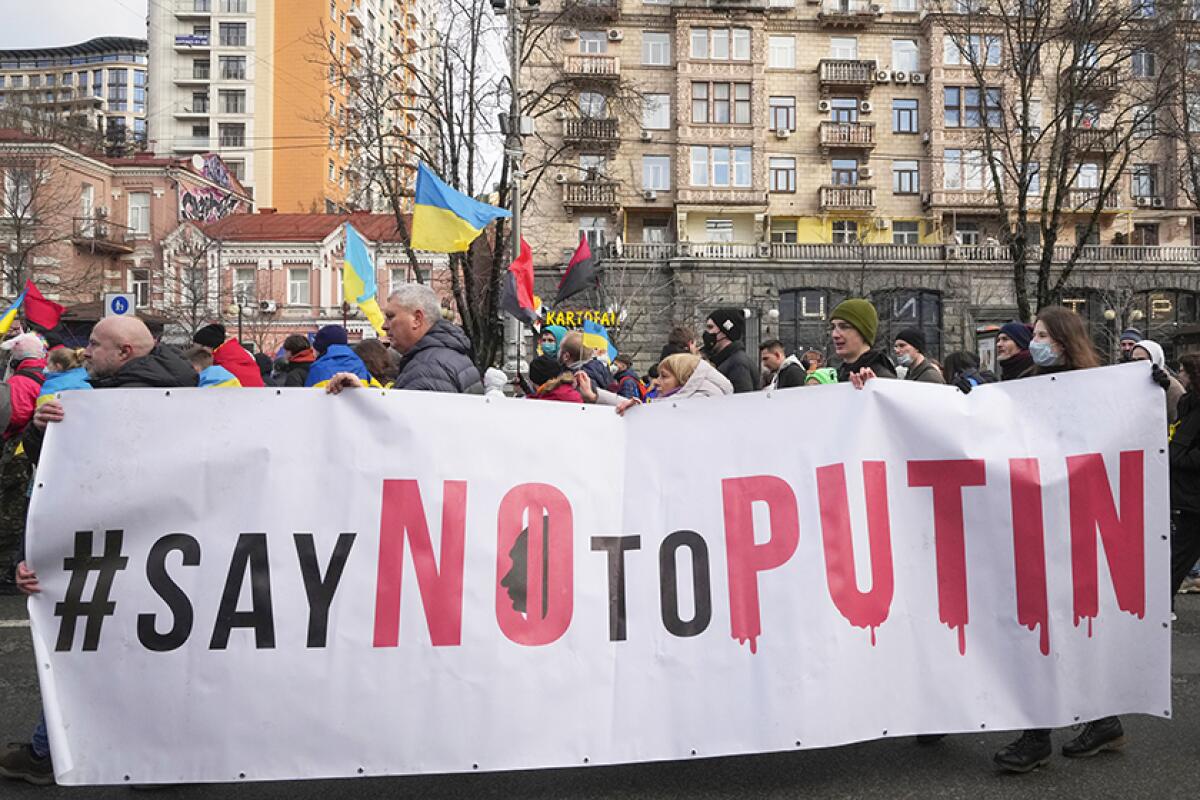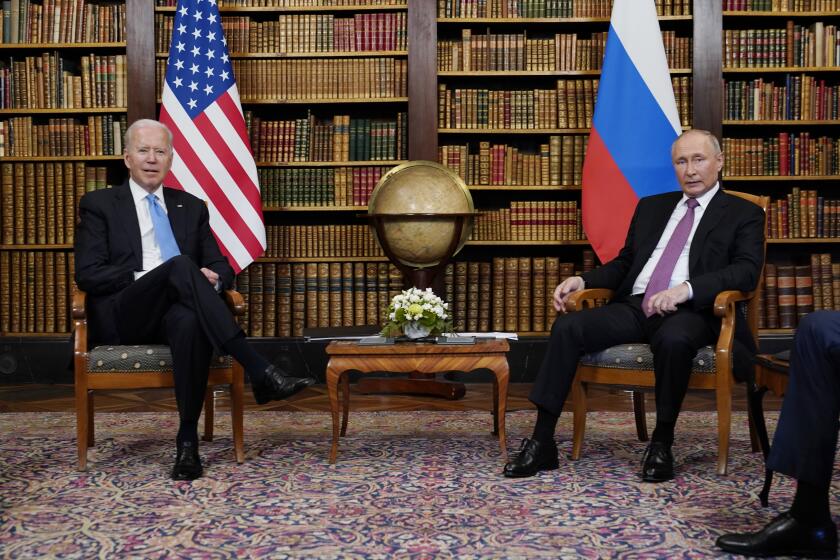Column: A deeply divided America finally has something it can agree on: Putin must be stopped

- Share via
I did not expect, at this moment in my life, to be reading up on nuclear war. The bomb drills of my childhood are a hazy memory, and ridiculous in retrospect, as if ducking and covering could save us from an atomic blast.
I really do not want to learn about the difference between the A-bombs of yesteryear and today’s much more powerful nukes, nor be reminded that when the United States dropped an atomic bomb on the Japanese city Nagasaki in 1945, everything within a mile radius was obliterated.
And yet, here we are, in the year of our Lord 2022, holding our collective breath after a despot halfway around the world announced Sunday his nuclear forces are now on high alert.
No one seems to know exactly what that means. All we know is that Russian President Vladimir Putin invoked the specter of the unthinkable — despite releasing a joint statement with the leaders of four other nuclear nations on Jan. 3, less than two months ago, vowing never to use such weapons.
“We affirm that a nuclear war cannot be won and must never be fought,” the leaders of the U.S., Russia, China, France and the United Kingdom, all permanent members of the United Nations’ Security Council, said in the statement.
Putin’s violence against Ukraine and far-fetched threat about nukes has prompted changes in the world order that few would have anticipated: Switzerland has abandoned its storied neutrality to support Ukraine. Likewise, the ever-neutral Finland and Sweden have taken steps to join NATO in the face of Russian aggression. Germany reversed its long-standing policy of not sending weapons to war zones.
And, for the first time, the European Union will finance the purchase and delivery of weapons and equipment for a country under attack — Ukraine.
Vladimir Putin is threatening to use nuclear weapons. How can you ignore that from a man who possesses 6,000 nuclear warheads?
Some awful aspects of human nature, however, never change. People of color — from Africa and India, mainly — have reported being turned away from border crossings or ordered off buses by Ukrainian security forces as they try to flee. U.N. officials acknowledged the reports and have condemned the apparent racism.
The underpowered former Soviet republic, a fledgling democracy long known as the breadbasket of Europe, has captured the hearts and imaginations of people around the world, hundreds of thousands of whom have poured into the streets to condemn Russia and support Ukraine. Thousands of antiwar protesters in Russia have been arrested.
The unexpected steeliness of Ukrainian President Volodymyr Zelensky, a former comedian and TV star who refused to abandon his country despite the neon target on his back, helped stiffen the spines of Western allies.
As we watch the war unfolding in real time, glued to our computers, phones, radios and TVs, we have to acknowledge that it’s not just Ukrainians and Russians who will feel the pain of this war.
Russia’s aggression has the potential to change all of our lives, whether that be reflected in the price of our gasoline, a shortage of certain goods, a volatile stock market or the terrifying possibility that Putin has unleashed the beginning of World War III.
Americans, so deeply riven by domestic political strife, have finally found something we can agree on: Putin must be stopped.
“In a rare bit of agreement,” reported my colleague David Lauter last week, “Republicans and Democrats had equally negative impressions of Russia, although Republicans were slightly less favorable than Democrats in their view of Ukraine, 66% versus 57%.”
But then, of course, there are the high-profile Republican outliers.
Former President Trump, who has fawned over Putin for years, praised the invasion of eastern Ukraine as a genius move. “He’s taking over a country for $2 worth of sanctions,” he told a gathering at Mar-a-Lago. “I’d say that’s pretty smart.”
Proving there is no self-aggrandizing lie he won’t embrace, Trump, who often spoke of withdrawing from NATO when he was president, took credit this week for the Western alliance’s very existence.
He also praised himself for sending arms to Ukraine when in fact he threatened to withhold the assistance if Zelensky did not dig up dirt to use against Joe Biden in the 2020 election. That thuggish move was the basis of his first, well-deserved impeachment.
The U.S. and other Western nations send Russia an average of $500 million for energy every day, effectively financing Putin’s aggression in Ukraine.
“Why is it disloyal to side with Russia, but loyal to side with Ukraine?” asked the perpetually mystified Fox News star Tucker Carlson, who has also lionized Hungary’s autocratic prime minister Viktor Orban.
J.D. Vance, the far-right Ohio Republican U.S. Senate candidate, showed how quickly human decency wilts in the face of partisan politics.
“I gotta be honest with you,” Vance said on Steve Bannon’s podcast days before Russia launched its attack. “I don’t really care what happens to Ukraine one way or the other. I’m sick of Joe Biden focusing on the border of a country I don’t care about while he lets the border of his own country become a total war zone.”
I have to believe this was disingenuous posturing on Vance’s part, a way of appealing to the Trump base by insulting Biden. He can’t be that stupid, can he?
After all, almost 90% of Americans, according to Gallup, view Putin’s war on Ukraine as either a “critical” or “important” threat to U.S. vital interests. Only 11%, Vance among them, think it’s “not important.”
Vance changed his tune a few days later but has continued to promote the Republican talking point that Biden’s “weakness” is responsible for Putin’s war on Ukraine.
As I write, a 40-mile convoy of Russian tanks and vehicles is advancing on the Ukrainian capital of Kyiv, civilians are fleeing rocket attacks and peace talks between Russia and Ukraine have broken down.
What will tomorrow bring? All we know for sure is that more death and more destruction — all of it unthinkable — will be inflicted before this war is over.
More to Read
A cure for the common opinion
Get thought-provoking perspectives with our weekly newsletter.
You may occasionally receive promotional content from the Los Angeles Times.














